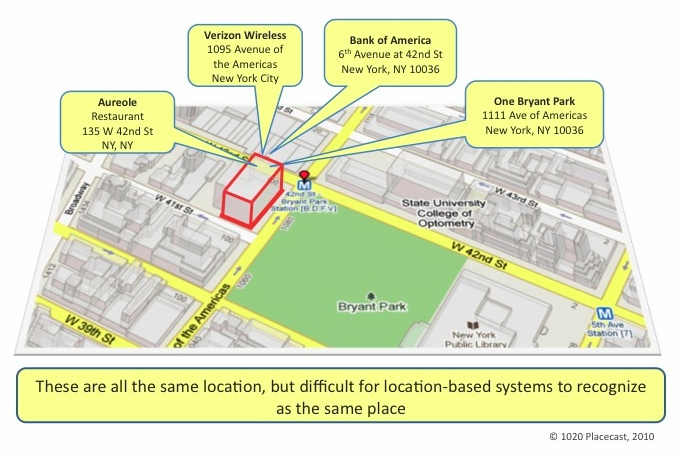
Following the location-based frenzy that took place at this year’s SXSW festival, my colleague MG Siegler highlighted a definitive issue when it comes to checking in on various social networks like FourSquare, Gowalla, Loopt and others. The problem is that each of these check-in services has their own places database, which means that a place on Foursquare may be slightly different than a place on Gowalla, even though they’re technically the same place. Moreover, within many location-based social networks, there are duplicates for some venues since people are allowed to create their own. Location-based advertising and marketing service Placecast is hoping to resolve this problem by launching its Match API, Rosetta Stone like-database for location venue data.
Placecast’s free Match API will enables location content providers and location-based application developers to refer to a location in any number of ways, and validate that those references resolve to one true location for each check-in. In more simple terms, the API will take duplicate listings for a venue and combine them into one listing. The API translates data across services and matches it for accuracy, regardless of the ID system. And because the Placecast Match API is an open system, Placecast’s Match API enables companies working with location data to use any (or multiple) ID system and resolve to one true location. For example, if I check-in to the lobby of the Hilton Hotel and a friend checks into the restaurant at the Hilton Hotel, the Match API would resolve these and show both as the same location and check-in venue.
The Placecast Match API aims to resolves two issues with large location-based data sets. First, it disambiguates addresses, indentifying all of the different ways to express the address of a location. Second, it maps all the relevant IDs from different content providers to that same place on the planet, so that it is always referred to correctly by any other system. Placecast’s system has already been in place for more than a year and has already processed millions of location records worldwide.
Location-based companies such as WCities, Socialight, Urban Mapping, and Buzzd have already begun testing the open web services API. Placecast’s CEO and founder, Alistair Goodman, tells me that identifying a venue or business correctly in a location based social network is the foundation for location-based advertising. His reasoning is that for a business to deliver promotions or marketing message, the network needs to correctly refer to the business in its location data.
Placecast’s Match API isn’t the only resolution to the issue of multiple check-in data for the same location. yesterday, SimpleGeo launched a Marketplace will make it easy for developers to see a range of different geodata and pick what they want to use. SimpleGeo also launched Storage Engine, which is is a cloud-based system to allow developers to store location and do queries on it, sort of like an Amazon S3 for geodata.
Check.in works around this place problem by doing a look-up on each service and letting you pick the correct check-in spot. But it’s a bit slow, and still seems rather tedious. The other option is to adopt a standard for places. The Activity Streams group is working on such a concept. Yahoo could also implement a system on top of its WOEID system. But this risk of adopting a standard for a location-based social network is sacrificing their their business since these place databases are one of the keys to each service.
Placecast, which recently raised $3 million in funding, also debuted its technology, called ShopAlerts, that allows retailers bring people into their stores by sending them text messages when they get near their retail outlets. The startup also offers a location-based advertising platform that weaves together location information and other data from audiences across the web, mobile, and email. Placecast will analyze inventory, segments audiences and targets ads for maximum relevance for advertisers and publishers.